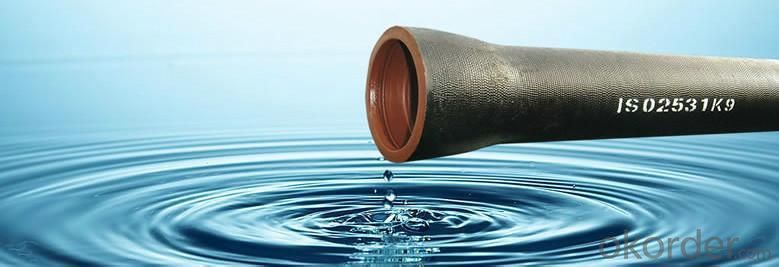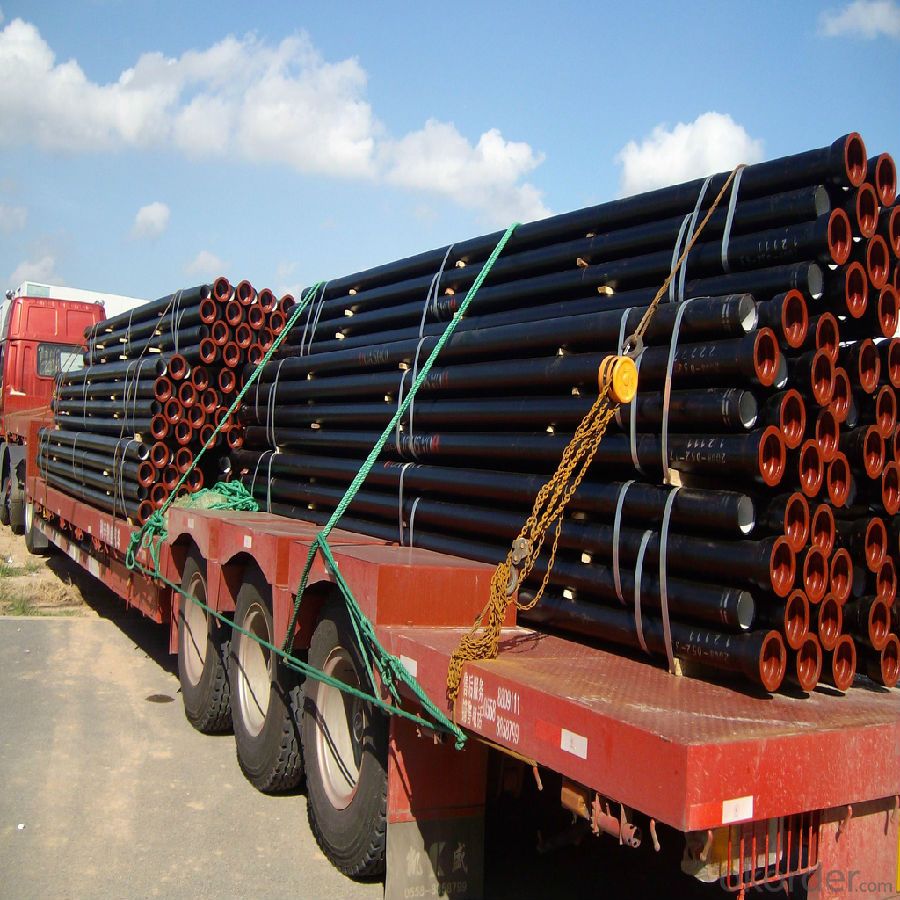Ductile Iron Pipe Model:T type / K type / Flange type Length: 6M
- Loading Port:
- China main port
- Payment Terms:
- TT OR LC
- Min Order Qty:
- 500 m
- Supply Capability:
- 100000 m/month
OKorder Service Pledge
OKorder Financial Service
You Might Also Like
1.Ductile Iron Pipe Description :
1) Pipes confirm to ISO2531,K9 class,T type joint,6m long,with inside cements lining conform to ISO4179, outside Zinc
spraying(130g/m2) and bitumen coating(70μm) conform to ISO8179.
2) Pipe ends: Spigot and socket ends, with 100% SBR rubber gaskets accoding to ISO4633
3) we can do third party inspection according to customer's request.
2.Main Features of the Ductile Iron Pipe:
•High yield strength
•High tensile Strength
•High corrosion resistance
•Pressure Resistence
•Anti-corrosion
3.Ductile Iron Pipe Images:


4.Ductile Iron Pipe Specification:
Place of Origin: China (Mainland)
Model Number: DN80-1600
Length: 6M/5.7M/NEGOTIATED
Standard: ISO2531 / EN545
Application: Potable/Sewage Water
Diameter: DN80-1600
Shape: Round
Hardness: 230
Pipe Wall Thickness: standerd
Pull Strength: 420
Yield (≥ MPa): 300
5.FAQ:
We have organized several common questions for our clients,may help you sincerely:
1.Q: Why would you choose ductile iron pipe rather than other pipe materials?
A:The reasons are obvious for that not only ductile iron pipe possesses the inherent strength and flexibility of ductile iron, combined with proven corrosion protection systems, but also the cost savings can be achieved from design to installation and commissioning.
2.Q:Why can you guarantee the inner of pipes can’t be corroded?
A: High alumina cement mortar lining and sulphate-resistant cement mortar lining. These two special linings are applicable to inner anti-corrosion for sewage pipes, improving resistance to erosion of the sewage components.
- Q:Does the cast iron pipe need separate corrosion protection?
- Ductile iron is characterized by its ease of decay and deformation, so if it is not a particular requirement, there is no need to do it alone
- Q:Are ductile iron pipes suitable for use in wastewater pumping stations?
- Yes, ductile iron pipes are suitable for use in wastewater pumping stations. Ductile iron is a strong and durable material that can withstand the harsh conditions and corrosive nature of wastewater. It has excellent resistance to corrosion and can handle high-pressure environments, making it an ideal choice for transporting wastewater in pumping stations. Additionally, ductile iron pipes have a long lifespan and require minimal maintenance, reducing the overall cost of operation and ensuring reliable and efficient wastewater transportation.
- Q:Can ductile iron pipe be used for underground storage tank systems?
- Yes, ductile iron pipe can be used for underground storage tank systems. Ductile iron pipe is known for its durability and strength, making it suitable for various applications, including underground storage tanks. Its high tensile strength and resistance to corrosion make it an ideal choice for containing and transporting liquids or gases in underground environments. Additionally, ductile iron pipe is highly resistant to external pressures and can withstand heavy loads, making it a reliable option for underground storage tank systems.
- Q:What is the K9 standard pressure for ductile iron pipes?
- Ductile iron pipe is a kind of cast iron. It is an alloy of iron, carbon and silicon. Graphite is exist in spherical form, usually graphite size is 6-7, casting spheroidization grade control requirements for 1-3 quality (spheroidization rate greater than 80%), so the mechanical properties of the material itself has been improved, has the essence of iron, steel performance.
- Q:How do ductile iron pipes handle soil movement?
- Ductile iron pipes have the ability to handle soil movement well due to their flexible nature. They can withstand stress and strain caused by ground settlement, thermal expansion, and contraction, without cracking or breaking. The high tensile strength and elasticity of ductile iron allow it to adapt to shifting soil conditions, making it a reliable choice for underground installations.
- Q:Ductile iron pipe in the direction of it?
- The use of cast iron by adding more than 18 nodularizer, after centrifugal ductile cast iron machine high speed centrifugal cast pipe, called "ductile" (Ductile Cast Iron Pipes), referred to as ball pipe, ductile iron pipe and ductile iron pipe etc..
- Q:The difference between ductile iron pipe and UPVC drain pipe
- UPVC tube or rigid polyvinyl chloride pipe, U-PVC pipe, is a kind of strong corrosion resistance, acid and alkali salt oil medium erosion, light quality, has certain mechanical strength, good hydraulic conditions, convenient installation, but easy to aging, high temperature resistant, but can not withstand the impact, applied to the domestic water system, DN50 pipe connection DN65, using a ring connected with the above.
- Q:Can ductile iron pipe be used for agricultural irrigation systems?
- Ductile iron pipe is a viable option for agricultural irrigation systems. This type of pipe is renowned for its robustness, longevity, and ability to resist corrosion, which renders it suitable for a wide range of uses, including agricultural irrigation. It possesses the capacity to endure high pressure, guaranteeing a dependable and enduring water transportation solution for irrigation systems. Moreover, ductile iron pipe is impervious to the chemicals typically present in water sources used for irrigation, ensuring the pipe remains intact and impeding any deterioration over time. Its pliability facilitates effortless installation and maintenance, positioning it as a pragmatic choice for agricultural irrigation systems.
- Q:How does ductile iron pipe perform in high-temperature steam applications?
- Ductile iron pipe performs quite well in high-temperature steam applications. Ductile iron is a strong and durable material, known for its ability to withstand high pressures and temperatures. When exposed to high-temperature steam, ductile iron pipes maintain their structural integrity and do not deform or crack easily. They have a high resistance to thermal expansion and contraction, making them suitable for applications where temperature variations are common. Additionally, ductile iron pipes have excellent corrosion resistance, which is especially important in steam applications where the presence of moisture can lead to accelerated corrosion. Overall, ductile iron pipes are a reliable choice for high-temperature steam applications, providing long-lasting performance and ensuring the safe and efficient transportation of steam.
- Q:How are ductile iron pipes transported and stored?
- Ductile iron pipes are typically transported and stored in a systematic and careful manner to ensure their safety and integrity. Transportation of ductile iron pipes usually involves the use of specialized vehicles, such as flatbed trucks or trailers, that are capable of accommodating the size and weight of the pipes. These vehicles are equipped with appropriate securing mechanisms to prevent any movement or damage during transit. The pipes are loaded onto the vehicles using forklifts or cranes, ensuring that they are properly supported and balanced to avoid any bending or deformation. During transportation, it is crucial to protect the pipes from external factors that could potentially cause damage. This includes placing covers or wraps over the pipes to shield them from adverse weather conditions, such as rain, snow, or excessive sunlight. Additionally, securing the pipes with straps or chains can prevent any shifting or rolling during transit. When it comes to storage, ductile iron pipes are typically stacked on specially designed racks or supports in a horizontal position. This allows for even weight distribution and minimizes the risk of deformation or stress on the pipes. The storage area should be clean, dry, and well-ventilated to prevent corrosion or deterioration. It is important to handle ductile iron pipes with care to avoid any impact or rough handling that could result in cracks or fractures. Workers involved in the transportation and storage process should be adequately trained to ensure they follow proper protocols and use the necessary equipment, such as lifting machinery and protective gear. Regular inspection of transported and stored ductile iron pipes is essential to identify any signs of damage or corrosion. This allows for timely repairs or replacements, preventing any potential issues when the pipes are installed for their intended use. Overall, the transportation and storage of ductile iron pipes require careful planning, proper equipment, and adherence to safety protocols to ensure their condition and performance are maintained.
1. Manufacturer Overview |
|
|---|---|
| Location | |
| Year Established | |
| Annual Output Value | |
| Main Markets | |
| Company Certifications | |
2. Manufacturer Certificates |
|
|---|---|
| a) Certification Name | |
| Range | |
| Reference | |
| Validity Period | |
3. Manufacturer Capability |
|
|---|---|
| a)Trade Capacity | |
| Nearest Port | |
| Export Percentage | |
| No.of Employees in Trade Department | |
| Language Spoken: | |
| b)Factory Information | |
| Factory Size: | |
| No. of Production Lines | |
| Contract Manufacturing | |
| Product Price Range | |
Send your message to us
Ductile Iron Pipe Model:T type / K type / Flange type Length: 6M
- Loading Port:
- China main port
- Payment Terms:
- TT OR LC
- Min Order Qty:
- 500 m
- Supply Capability:
- 100000 m/month
OKorder Service Pledge
OKorder Financial Service
Similar products
New products
Hot products
Related keywords



























